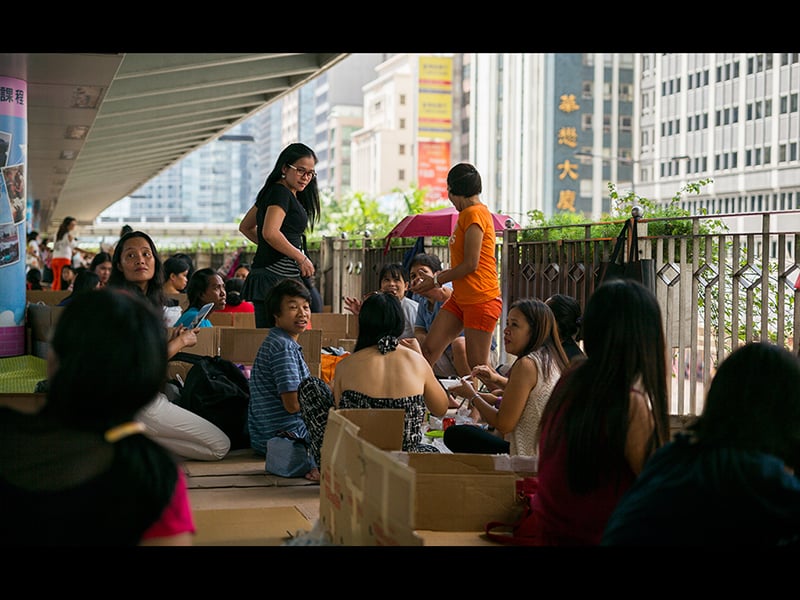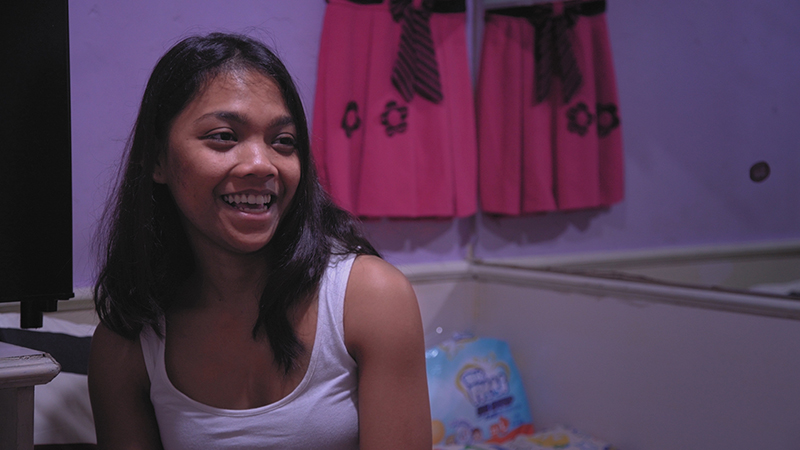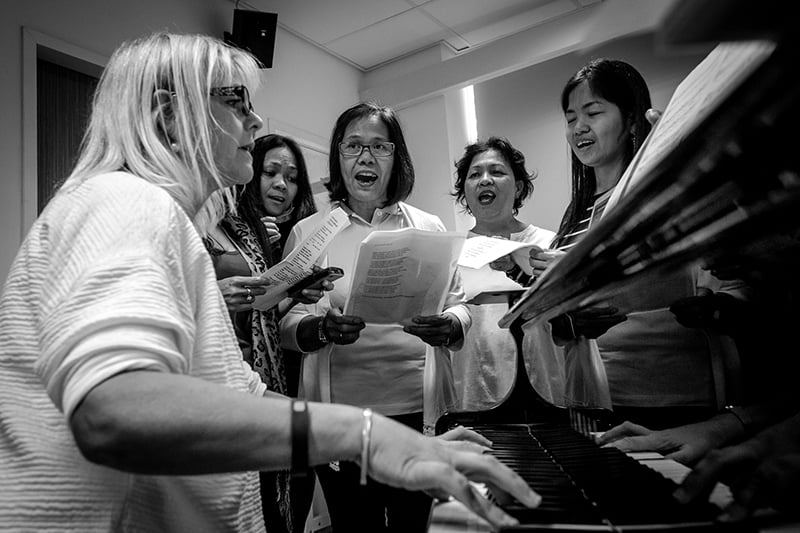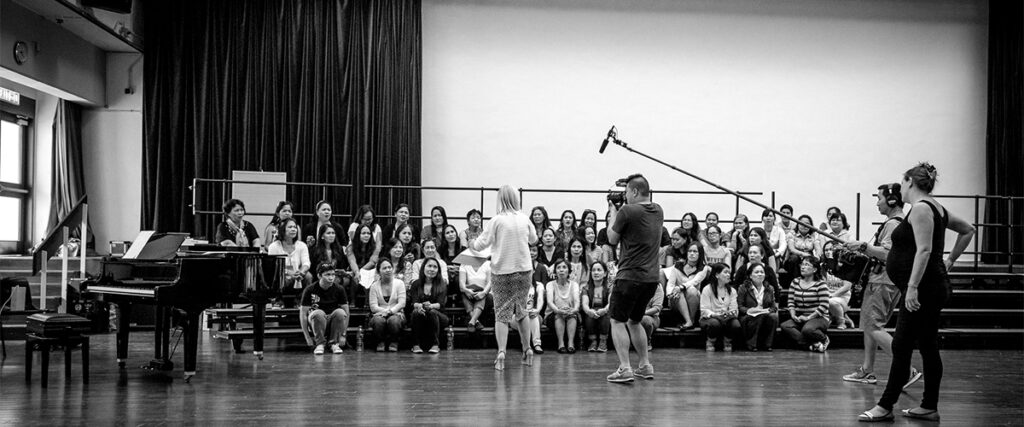Filmmaker Joanna Bowers explores the challenging circumstances women face as they come to work as domestic helpers in Hong Kong in her first documentary, The Helper and why it took over 6 years to produce.
In 2011 British Filmmaker, Joanna Bowers distinctly remembers being astonished by the overwhelming volume of women huddled in cardboard boxes, which inspired her to produce the documentary, The Helper. “I was intrigued to see them sitting together on the walkways.” This was her first encounter with domestic helpers which triggered the question, why are they were segregated from the rest of society? The situation was unlike anything she encountered before—for Joanna, the support for domestic helpers was shocking. As we talk, she recalls one of the stories she struggled with, “ One of the daughters of the helper was assaulted in the Philippines. The mother asked me to do more than anonymising her daughter as she was concerned her little girl would end up living with the stigma of the assault if the film gets distribution rights in the Philippines.”

After studying Broadcast Journalism at Leeds University, U.K, she worked in the film industry in Los Angeles before establishing her production company, Cheeky Monkey. Whilst visiting a friend in Hong Kong in 2011, a chance encounter at a party landed her production company with creative responsibility in Asia which resulted in her move to Hong Kong. A year later, Joanna was introduced to her producing partner, Tony Verb and they discussed their mutual goal to create a piece of film that would document the lives of domestic workers. Of her first meeting with Verb, she explains openly, “We had the same vision and hit it off straight away, but nothing happened for the first couple of years—in fact, Tony had been pitching a reality-style show to networks in the region but the subject matter had been considered too controversial and political.”
Bowers and Verb launched a Kickstarter campaign that raised $89,000 in just under a week—an achievement they attributed to the emotive subject matter of their campaign. From her initial encounter with domestic workers 6 years ago, to the release of her first feature film titled ‘The Helper’ earlier this month, Joanna shares with us her eye-opening accounts which have shaped her understanding and perception on the worldwide struggle of women who migrate for the purpose of domestic work.

The Helper started back in 2015 with a Kickstarter campaign, can you tell us a little about that?
My producing partner Tony Verb had done something similar before so he had connections with Global Shapers and the Domestic Worker’s Roundtable. This meant that we had access to unions and NGO’s. From that we were able to understand the issues domestic helpers faced.
We made a trailer for our Kickstarter campaign but the thing is that people don’t realise you’ll hit a wall after the first week. After all of your friends and contacts have pledged – you wonder where to go next. At this point, we were lucky that a man reached out to us and he turned out to be the Head of Marketing for Facebook in Hong Kong.
What is the biggest challenge you’ve faced whilst making the documentary?
Working within our budget has ultimately been our biggest challenge. Within the film industry, there’s this heavy assumption that filmmakers have unlimited funds and that often isn’t the case. We’ve had to find money ourselves to keep this project going because if you want the best people to be involved, you have to pay them.
What do you hope that releasing the film will achieve?
We hope to create awareness about the challenging circumstances and adversity many of these women face when they come to work as domestic helpers in Hong Kong. We want to humanise domestic helpers so they receive some gratitude for their work in the hope to shift the way that they are treated. These women do not migrate here for fun – if you migrate for fun you’re called an expat, if you have no other choice, that’s called migration.
Aside from the awareness we hope to raise, the film is piece of creative, intellectual property and our intention has always been to make a return on it.
The film premiered in May of this year, how has it been received?
The response has been truly overwhelming. We had many of the helpers from the film at the premiere. To witness their reactions to seeing themselves on the big screen for the first time was amazing.
What has been the biggest thing you have learned from making The Helper?
I’ve learned how difficult it is to know when it’s time to stop filming. With this subject matter, there is enough content to make a whole TV series; we could still be shooting to this day as the stories are still ongoing.
How do you think Hong Kong would be a different place without migrant women working as domestic helpers?
I think the economic impact would be huge. There would be far fewer families in which both parents could work, and this would be a shame. The availability of affordable domestic help attracts some of the best and the brightest corporate talent and entrepreneurs. I read that 45% of the entrepreneurial community in Hong Kong are women, that percentage is much higher compared rest of the world. As a Mum, I wouldn’t have been able to make this film without my helper at home.
Has there been a common theme throughout the stories of the women you interviewed?
We have interviewed hundreds of women, and throughout all of their stories, the underlying theme has been of bravery. These women are incredibly strong and have overcome considerable odds to survive – whether that be hanging onto their broken families or going the extra mile and achieving incredible things. Their resilience is exceptional.
Have any of the stories you have filmed struck you particularly hard?

While we were filming, the 5-years-old daughter of a choir member was assaulted in the Philippines. This became an impactful part of the film because it makes people realise how much these women are risking when they move away from their home. After the premiere, the mother asked me to do more than anonymising her daughter. She was concerned that if the film gets distribution rights in the Philippines, her little girl would end up living with the stigma of the assault.
The other story is that of Nurul, a Pathfinders beneficiary who ended up homeless and pregnant after her employers falsely accused her of theft. She is now an asylum seeker with her 3-year-old daughter who doesn’t have an Indonesian passport. If they are extradited, she will be unlikely to be able to return to her family with a mixed race daughter. The little girl has since been offered a full scholarship by Woodland’s Primary School but she won’t be able to take up this incredible opportunity if they are extradited.
What would you say is the biggest sacrifice made by a woman who leaves her home country to work as a domestic helper?
It has got to be leaving her children, as a Mum I don’t know how these women do it. I have a friend whose helper recently went back to the Philippines to have her baby, and she didn’t return. My friend understood and respected this because if you put her in the same situation, she would have made the same decision herself.
Could you tell us about your relationship with your domestic helper and her goals?
We hired her after she graduated. Her mum also spent 30 years working as a domestic helper in Hong Kong so initially I felt that if her daughter came to work in the same role then was her mother’s sacrifice worth it. The whole point is to create a better future for the next generation.
My domestic helper and I have a deal – she can stay for 2-5 years, but she must go home to return to her studies. She plans to study for a Masters in Psychology and then become a high school counsellor. Unfortunately, due to the financial pressure from her family, she isn’t in the position to return. However, she can’t stay here for forever – she’s got to have a life of her own.
Are there other parts of the world where women working as domestic helpers face similar or more difficult challenges?
Hong Kong has a framework to support a relatively healthy and respectable employment relationship. However, this is not the same in Singapore where domestic workers are entitled to only one day off per month and obliged to have a pregnancy test every year. The Middle East doesn’t have a great human rights record either. You hear horrible stories coming out of that area and the situation is similar in Africa and Latin America. Migration to do domestic work is a global phenomenon, and for this reason, we are hoping the film will reach a global audience.
How did you find filming in the Philippines where many of these women come from?
We filmed one of the choir members as she visited her home in Manilla. We saw the home she built with the money she had saved. Her eldest son had a difficult time dealing with her being away for so long. Since his first birthday, his Mum had been absent for every birthday and Christmas. Missing these special moments must have put incredible pressure on the relationship. From what I have seen there is often a lot of resentment until the children reach late teens and can understand it better.
What can we do to improve the lives of women working as domestic helpers in Hong Kong?
Take a minute to stop and say thank you. We have asked hundreds of women this question, and they respond with ‘no illegal loans’ and ‘regulate employment agencies, ’ but in the end, the overwhelming response is just to have their work appreciated and respected.
And on a bigger scale are you able to say what you think could be done to improve the situation?
Things are certainly being set in motion and organisations such as the Fair Employment Agency are creating favourable hiring situation to ensure helpers aren’t being charged unfair fees. In the past I don’t think employers were aware that helpers were being charged fees of up to 3 months salary. The other thing is awareness and education of the issues – we are taking our film into businesses and schools around Hong Kong to educate the next generation.
Do you have any plans to release the film in the Indonesia or the Philippines?
We are talking to distributors in the Philippines already. It is important for people in their home countries see what their life is like. Also, for the children and families left behind to get some insight and maybe a different perspective on what their family members are doing and why they are doing it.
What are your plans for after the film has been released?
Ultimately, I want to be the original creator of a international-themed content, with ethnically diverse casts and strong female characters. Most of the filmmakers in Hong Kong seem to be making material for China – which is a great market with a huge audience, but I like the idea of selling the same content to China and the West. It is something that no one else in Hong Kong seems interested in doing, and that is wasted opportunity for me.
When and where can we see The Helper?
The film is showing at AMC Pacific Place and we are sold out until 22nd October. However, we have released more tickets, and we’ll run the film as long as there is a demand for it.
Details
helperdocumentary.com
Related Articles
SCC Divas: The Filipino Helper Team Taking Hong Kong’s Cricket Scene By Storm
The New Savvy Empowers 100M Women To Gain Financial Independence
Cookie Smiles: The HK Social Enterprise Serving Up Cookies With A Cause





